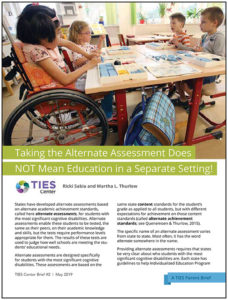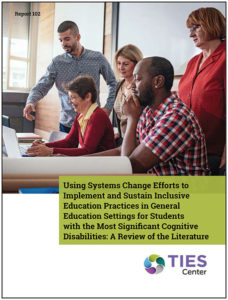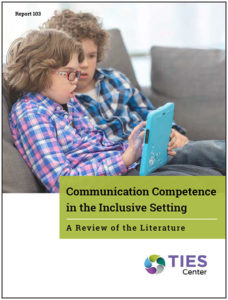An NCEO affiliated center, TIES Center, which is the national center on inclusive policies and practices for students with the most significant cognitive disabilities, has several new publications.
 Taking the Alternate Assessment Does NOT Mean Education in a Separate Setting! (TIES Center Brief #2). Students with the most significant cognitive disabilities benefit from participation in academic and social interactions with their same-age peers without disabilities in the general education classroom. This Brief is written especially for parents to help them support their child. The decision about which assessment a student takes is separate from the decision about where a student is educated. Recommendations for parents include:
Taking the Alternate Assessment Does NOT Mean Education in a Separate Setting! (TIES Center Brief #2). Students with the most significant cognitive disabilities benefit from participation in academic and social interactions with their same-age peers without disabilities in the general education classroom. This Brief is written especially for parents to help them support their child. The decision about which assessment a student takes is separate from the decision about where a student is educated. Recommendations for parents include:
- Communicate with your child’s teachers about your high expectations for your child. This may mean requesting that a communication system be developed for your child, or it may mean that you work with your child’s teacher to determine how to develop the skills needed to be on track for successful postsecondary education or competitive integrated employment by the time your child leaves school.
- Emphasize your expectation that the school will adopt the least dangerous assumption for your child. The least dangerous assumption indicates we must assume all students can learn when given the opportunity to learn and appropriate educational supports until the field has data to show otherwise.
- Develop a strategy for ensuring that you can support your child to be successful in the general education classroom—with peers without disabilities—for as many years as possible. You may need to provide information to your child’s educators, including the general educator, about how to provide your child access to the general education curriculum (see Brief for details).
 Using Systems Change Efforts to Implement and Sustain Inclusive Education Practices in General Education Settings for Students with the Most Significant Cognitive Disabilities: A Review of the Literature (TIES Center Report #102). This report presents the findings from a literature review that examined how systems change efforts can guide initiatives to increase and sustain the placement of students with the most significant cognitive disabilities in inclusive general education settings, as well as increase and sustain opportunities for these students to learn core academic standards-based curriculum through the implementation of inclusive education practices. The report concludes with the identification of several components associated with effective and sustainable systemic change efforts related to the implementation of inclusive practices.
Using Systems Change Efforts to Implement and Sustain Inclusive Education Practices in General Education Settings for Students with the Most Significant Cognitive Disabilities: A Review of the Literature (TIES Center Report #102). This report presents the findings from a literature review that examined how systems change efforts can guide initiatives to increase and sustain the placement of students with the most significant cognitive disabilities in inclusive general education settings, as well as increase and sustain opportunities for these students to learn core academic standards-based curriculum through the implementation of inclusive education practices. The report concludes with the identification of several components associated with effective and sustainable systemic change efforts related to the implementation of inclusive practices.
 Communication Competence in the Inclusive Setting: A Review of the Literature (TIES Center Report #103).This report presents findings from a literature review that was conducted to identify evidenced-based approaches to supporting the development of communicative competence for K-8 students in inclusive educational settings. Specifically, the review examined whether communication programming employing augmentative and alternative communication (AAC) is being successfully used in inclusive elementary and middle school settings, and what elements of the communication program are most likely to affect students’ communicative competence.
Communication Competence in the Inclusive Setting: A Review of the Literature (TIES Center Report #103).This report presents findings from a literature review that was conducted to identify evidenced-based approaches to supporting the development of communicative competence for K-8 students in inclusive educational settings. Specifically, the review examined whether communication programming employing augmentative and alternative communication (AAC) is being successfully used in inclusive elementary and middle school settings, and what elements of the communication program are most likely to affect students’ communicative competence.
